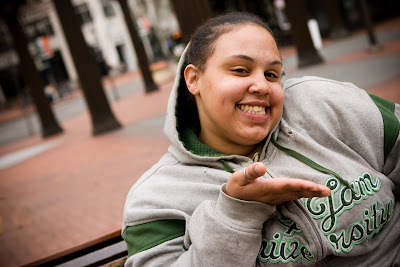Jalina saved my life. Kind of.
I met her a few days ago in the Square. Our group was handing out soup, socks, hot cocoa and red licorice sticks to the youth who were hanging out in Portland’s “living room” downtown.
It was a fun. Jocelyn and Christina headed up the photographers, taking portraits of the people, coaxing them into smiling and posing in front of the camera. It didn’t take them much work. People were more than happy to oblige.
Laura and Jake spent a lot of time working in some of the more “unglamorous” jobs; handing out the soup and socks while making sure that garbage wasn’t left to collect on the ground. They kept going, talking with people as they worked but never neglecting the duties that they had been given.
My assignment was to talk to people and get them to share their stories and thoughts. I was mingling through the crowd, trying to get people to write open letters down on my pad of paper. People are usually more than willing to share their perspective on life and I found myself flipping through the sheets of papers.
I got a paper cut. It bled. A lot.
It got past the ignoring stage when blood spilled on the paper. Who knew that such a tiny cut could be such a gusher? Whitney and Jalina sprang into action trying to find a Band-Aid for me. The local Starbucks didn’t have one; however, they were able to supply us with gauze and a latex glove.
Jalina knew just what to do. It turned out that she was going to school to become a phlebotomist. As she created a tiny tourniquet on my finger, we started talking. It wasn’t long before she was sharing her story with me.
Her mother had died recently. Jalina had been her “wild child” that she had loved right up to her dying day. Jalina has been couch hopping recently, trying to stay off the street by living on the hospitality of her friends. It hasn’t been easy. She’s working as hard as she can to make her mother proud. She didn’t want handouts to help her off the street, she wanted to work. The American dream still thrives, even on the street.
When I left, we gave each other a big hug. We had bonded over Band-Aids and stories of our mothers. We parted as friends not strangers. I can’t wait to run into her again.

______
Day 9
Dignity: the quality or state of being worthy, honored, or esteemed. (Merriam-Webster’s Dictionary)
Taylor and I were combing the waterfront trying to find people to give us their opinion on the homeless population of Portland. Some people gave their opinions freely while others guarded them fiercely. We were asking members of the homeless community to write letters to the world, telling them of their thoughts and lives. When we approached the homeless couple on the waterfront, both of us were slightly nervous. How would they receive us?
She sat cross-legged on the park lawn, carefully filing her nails with a white emery board. Her snowy long hair hung freely, contrasting with her dark jacket and navy cotton trousers. A rucksack sat on the wet grass halfway between her and her male friend.
He was a stark contrast to her. He was still obviously homeless but while she concentrated on maintaining her hands, his were stained with grime. A freshly rolled cigarette hung loosely between his fingers. When he smiled, it was echoed in his sky-blue eyes that were framed by deep lines etched in his leather face. She never bothered to make eye contact with us. He was missing a few teeth but his gummy smile was more genuine than the ones on tooth paste commercials.
“I just wish that people wouldn’t look down on us just because we’re homeless,” the man said as he scribbled out a letter in the notebook. He had seemed surprised that we had stopped to talk to him in the first place.
The woman refused to write. “I’m not interested in writing a letter,” she said, carefully pronouncing each word with a generous mixture of aloofness and iciness. She never stopped filing her fingernails, always checking to make sure that she was shaping them in the peculiar way she wanted.
As we walked away, I was struck by the dignity the woman had possessed. It could have been pride but it seemed to deeply ingrained for that. It hadn’t been a personal thing. She had been almost regal in the way that she had turned us down. While she hadn’t exactly been anywhere near friendly, I couldn’t blame her. How many other young idealists just like us had she met over the years?
The other thing that struck me was the amount of personal care that she had for herself. While we tend to stereotype homeless people as dirty and grimy (and many of them are), she had been taking great lengths to ensure that she didn’t fit that stereotype. She looked like she would have been right at home in the front room of a beauty parlor, filing her nails while gossiping with her friends. She knew that she was made for better stuff than wearing castaway clothes. Living under the open sky quickly looses it’s glamour in a city that rains most of the year.
I wish the woman would have written a letter. She could have helped us restore dignity to the rest of the people.



